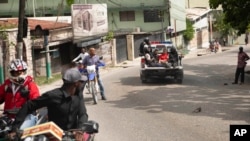The assassination of Haitian President Jovenel Moise occurred amid political and other crises in the Caribbean country, further roiling the world’s first Black-led republic that won its freedom from France during a 19th century slave revolution.
But independence at end of the 1791-1804 Revolution brought a crippling financial burden, as Haiti was forced to pay reparations to former French enslavers, a stifling debt that was not paid off until 1947.
Haiti has since struggled with phases of invasion, violence and dictatorships. In addition to natural disasters, these factors have left Haiti as the poorest nation in the Western Hemisphere.
The following are some crucial recent events in Haiti’s nearly 220-year history:
• A United Nations peacekeeping force was deployed to Haiti in 2004 to help stabilize the country after then-President Jean-Bertrand Aristide fled into exile amid an armed revolt against his rule. The U.N. force withdrew in 2017.
• A 2010 earthquake killed between 100,000 and 300,000 Haitians and inflicted widespread damage in the country, including the capital of Port-au-Prince. The quake worsened economic, political and social woes, despite a global relief campaign.
• President Michel Martelly won a second term in office in 2011. Between 2012-2014, regular protests erupted against corruption and chronic poverty, with demonstrators demanding Martelly’s resignation.
• In 2017, banana exporter-turned-politician Jovenel Moise was declared the winner of the country’s 2016 presidential election.
• Political unrest and gridlock contributed to Haiti’s failure to hold elections in 2019, allowing Moise to gain more authority and rule by decree.
• Opposition leaders claimed on Feb. 7, 2021 that Moise’s legal term had expired since five years had passed after he would have assumed the presidency if the first vote had been allowed. Moise maintained his term ends in February 2022 since he was not sworn in until 2017.
• Joseph Jouthe resigned as prime minister in April as killings and kidnappings increased, leaving the government without a formal prime minister since parliament has yet to approve his replacement.
• As a result of a Moise decree, the government has set new elections for September and a possible runoff for November. The government has also lobbied for a referendum on a new constitution that critics contend may allow the president to further extend his power. A vote on the referendum has been delayed.
• President Jovenel Moïse was assassinated on July 7 in the capital Port-au-Prince by unidentified gunmen.
Information from AP and Reuters was used in this report.
Key Events in Haiti Before Killing of Haitian President Moise
- By VOA News





